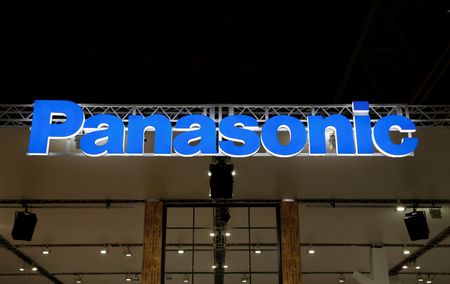By Daniel Leussink
TOKYO (Reuters) -Japan’s Panasonic Holdings Corp cut its annual operating profit forecast by 12.5% on Thursday after lower-than-expected third-quarter earnings, hit by headwinds from a slowing global economy and persistently high raw materials prices.
The company faces challenges amid a tricky outlook for global growth, as it looks to further build out its energy business, which includes making auto batteries for electric vehicle (EV) maker Tesla Inc.
The conglomerate slashed its operating profit forecast to 280 billion yen ($2.18 billion) for the financial year to Mar. 31, from 320 billion yen, in part due to a less rosy outlook for its industry segment this quarter.
It expects to invest up to about 600 billion yen in the three years through March 2025 in a new battery plant it started building in Kansas last year, Group Chief Financial Officer Hirokazu Umeda told an online earnings presentation.
Panasonic said in presentation materials it will aim to grow profits in automotive batteries by expanding sales of its 2170 model lithium-ion battery cells and commercialising the more advanced 4680 format battery.
The company’s energy unit last month signed an agreement with Lucid Group Inc to supply lithium-ion batteries for the EV maker’s full lineup, including its “Air” luxury model.
The company also said it aimed to begin supplying the 4680 format battery to the North American market in the financial year through March 2024 to commercialise this model of battery cells.
Panasonic’s third-quarter result, with its operating profit rising 16% to 84.4 billion yen in the three months ended Dec. 31, fell short of a mean estimate of 95.31 billion yen profit from nine analysts.
Jefferies analysts said in a note before the earnings release that the company’s overly diverse business portfolio lacked focus and was centred on low-margin, cyclical businesses.
Most investors were focused on more clarity and details about U.S. Inflation Reduction Act benefits for Panasonic’s EV battery cell production, such as the size and sustainability of subsidies, the analysts added.
The energy business’ operating profit fell nearly half to 28.9 billion yen for the nine months through the end of December, hit mainly by high prices for raw materials and transport, despite a 25% rise in sales over the period.
($1=128.6700 yen)
(Reporting by Daniel Leussink; Editing by Jamie Freed and Clarence Fernandez)

